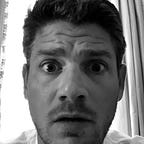Cash and Sex Week: Part IV, The Common Elements
Thus far, we’ve looked at three applications of the Sex & Cash Theory:
- The Late Bloomer — Ken Jeong’s slow burning comedy/acting career that was brought up to speed in parallel to his career in medicine until he was ready to jump from one train to the next.
- The Grinder — George Clooney’s meandering path in early life through different fields until he fell in love with acting and bet everything on it, sleeping on strangers floors and working jobs paying just enough to get by until he broke through.
- The Moonlighter — Ryan Holiday’s rapid ascent through the business world and practice of moonlight writing that distilled the books he was reading, the wisdom he was gaining, and the skills he was mastering.
When we closely examine these three applications of Sex & Cash Theory, there are two major common elements that allowed The Late Bloomer, The Grinder, and the Moonlighter to be successful:
Long hours
The time they were putting into their “Sex” pursuits was real work but felt more like an escape from their “Cash” pursuits. Doing work that strictly pays the bills drew energy out of them and doing work for the pure love of it recharged their energy reservoirs. Despite working longer total hours and spending their free time working on their passion projects (as opposed to working the day job and “relaxing” on nights and weekends, waiting for the day they would have enough time and money to pursue their passion “full time), each of the examples we looked at actually gained energy and momentum. By providing both needed inputs, the Cash and Sex strategy created a synergistic balance that allowed the machine to produce cumulatively more.
Freedom to develop
The “Cash” job in each of these three case studies was obviously not their top choice for doing long term, but it played a valuable role. Having their needs covered allowed them the time to develop their craft without the pressure of a shortening fuse. Ken Jeong wasn’t desperate for a part in a hit movie because he still a successful physician; he had ample time to build his skill up to the threshold needed to be consistent Hollywood actor. But when “Knocked Up” did hit it big, it was his signal to make the leap. George Clooney attempted several different careers and when he finally decided that acting would be his chosen field, he had enough experience in what wasn’t a fit to justify his decision to go all in. Ryan Holiday wasn’t writing books about subjects he didn’t care about in a desperate attempt to be a writer, he was distilling the things he was working on, the wisdom he was gaining, and the thoughts in his head into his own voice and his books could naturally spring from that. If they weren’t good enough to support a career, he was already doing fine.
